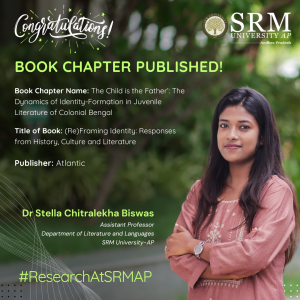 The complexities of identity in literature are a significant area of scholarly inquiry, especially in colonial and postcolonial studies. A key addition to this discourse is Assistant Professor, Dr Stella Chitralekha Biswas’ book chapter on “The Child is the Father: The Dynamics of Identity-Formation in Juvenile Literature.” in the anthology, (Re)Framing Identity: Responses from History, Culture and Literature by Atlantic Publishers & Distributors.
The complexities of identity in literature are a significant area of scholarly inquiry, especially in colonial and postcolonial studies. A key addition to this discourse is Assistant Professor, Dr Stella Chitralekha Biswas’ book chapter on “The Child is the Father: The Dynamics of Identity-Formation in Juvenile Literature.” in the anthology, (Re)Framing Identity: Responses from History, Culture and Literature by Atlantic Publishers & Distributors.
A Brief Introduction to the Book:
This anthology (Re)Framing Identity: Responses from History, Culture and Literature is a significant and timely effort to understand the issues of identity because in the postmodern age, it is one of the highly debated and discussed issues in the field of History, Culture and Literature. In the postmodern age, the question of identity with reference to literature becomes important because the monolithic idea of identity is challenged in both imaginative and critical works. The significance of this anthology also lies in the fact that it scrutinizes the process of identity formation in the Indian subcontinent and problematizes the notions of its unity and continuity across time and space philosophers. This anthology continues the tradition of the critique of identity formation right from Stuart Hall, who, in his article in Questions of Cultural Identity (1996) says, “The deconstruction has been conducted within a variety of disciplinary areas, all of them, in one way or another critical of the notion of an integral, originary and unified identity”. Therefore the purported aim of this anthology is to analyse the conflicts and amalgamation among numerous races, ethnic groups, religions, linguistic acommunities and various other stakeholders and to understand how these conflicts and amalgamations resulted in the formation of diversified identities in the light of Stuart Hall’s ideas, “identities are never unified and, in late modern times, increasingly fragmented and fractured; never singular but multiply constructed across different, often intersecting and antagonistic, discourses, practices and positions. They are subject to a radical historicization, and are constantly in the process of change and transformation”
Significance of the Book Chapter:
The understanding of identity formation has evolved from the philosophical understanding to its discursive formation and further to the neurological understanding of how identity is shaped. The fundamental idea followed in the anthology can be summed in by Stuart Hall, “actually identities are about questions of using the resources of history, language and culture in the process of becoming rather than being: not ‘who we are’ or ‘where we came from’, so much as what we might become, how we have been represented and how that bears on how we might represent ourselves. Identities are therefore constituted within, not outside representation. They relate to the invention of tradition as much as to tradition itself, which they oblige us to read not as an endless reiteration but as ‘the changing same’ not the so-called return to roots but a coming-to-terms-with our ‘routes’. They arise from the narrativization of the self, but the necessarily fictional nature of this process in no way undermines its discursive, material or political effectivity, even if the belongingness, the ‘suturing into the story’ through which identities arise is, partly, in the imaginary (as well as the symbolic) and therefore, always, partly constructed in fantasy, or at least within a fantasmatic field”. This particular analysis of identity formation in the Indian subcontinent under numerous pressures exerted through various mediums like literature, folk theatre and literature and philosophical texts not only in India but outside as well among the Indian diaspora located especially in Euro-American parts of the world, making this anthology a crucial book not only in the country but also at an international level.
Target Audience:
It is inspiriting to read such exhaustive literary anthology by eminent academicians and scholars and broadens one’s horizon of critical thinking as one goes through the collection. The book will definitely open up new trajectories of research in the field of postcolonial studies, bhasha literature and identity theory. It will also motivate students and researchers to explore the formation and representation of identities in the subcontinent in terms of culture, race, ethnicity, language, religion, caste, gender and politics.

